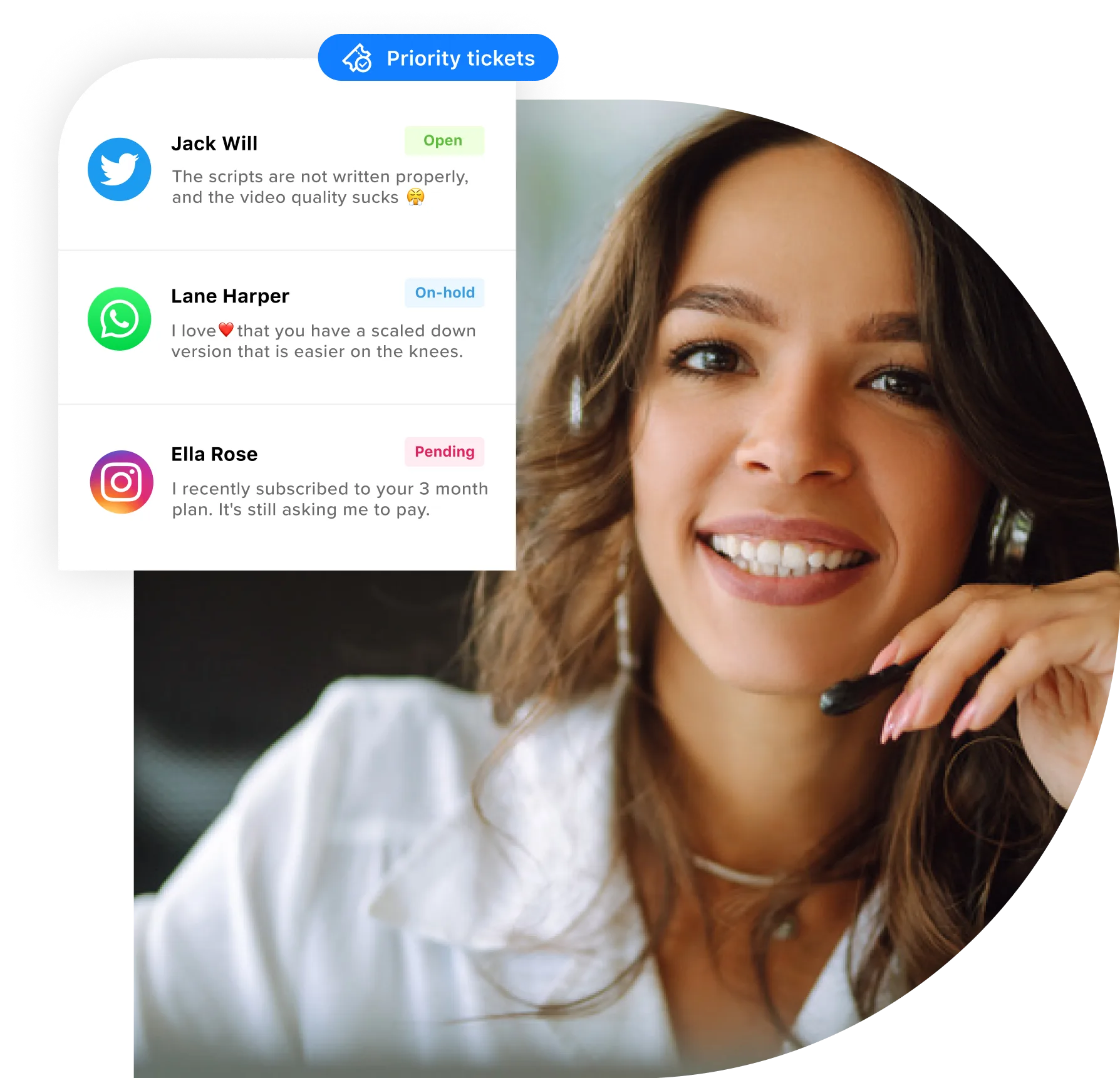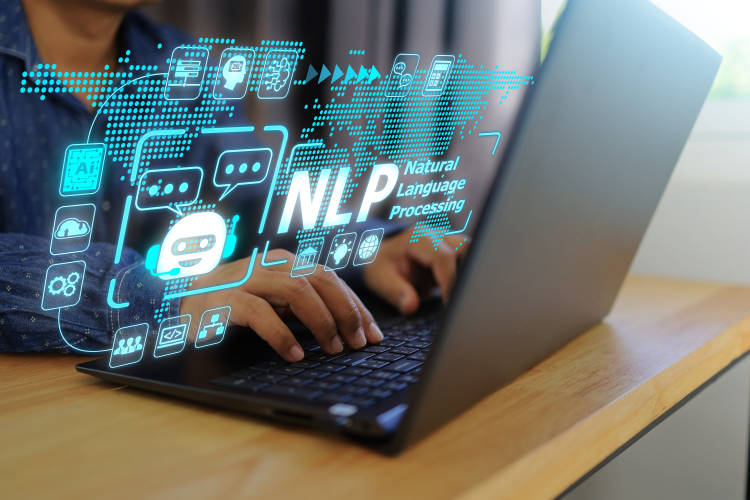Customer service that feels human is simply irreplaceable. While live agents often try to connect with customers and personalize their interactions, NLP in customer service boosts chatbots and voice bots to do the same. It helps your bots be more natural, personal and less rigid in their approach to collecting all relevant context and resolving customer queries. Keep reading to learn how NLP in customer service can help your customer service automation be smarter, faster, and more precise.
What is NLP in customer service?
NLP in customer service is the use of Natural Language Processing technology to interpret, understand and respond to customer inquiries in a human-like manner, aiming to enhance the quality, efficiency and accessibility of customer support interactions. This technology plays a pivotal role in elevating the quality of customer service by automating certain tasks, providing quick responses and enhancing overall communication through chatbots and voice bots.
The NLP processes enable machines to comprehend the structure and meaning of human language, paving the way for effective communication in customer service interactions.
Read More: A Detailed Guide on Customer Interaction Analytics
It involves several key steps:
Tokenization: Raw text is broken down into smaller units called tokens, which could be words or phrases. This step lays the foundation for the system to understand the structure and meaning of the text.
Part-of-speech tagging: NLP identifies the grammatical parts of speech for each token. This helps the system comprehend the relationships between words and the overall context of the sentence.
Named entity recognition: NLP identifies and classifies entities such as names, locations, dates and more. This step is crucial for extracting relevant information and understanding the specifics mentioned in the text.
Parsing: The relationships between words are analyzed to create a syntactic structure. This parsing step allows the system to understand the grammatical structure and meaning of the text.
Sentiment analysis: The system interprets the meaning of the text, considering the context, intent and sentiment. This enables the AI to generate meaningful responses that align with the user's query.
10 examples of NLP in customer service
Incorporating NLP into customer service strategies empowers businesses to provide more efficient, personalized and responsive support, ultimately leading to enhanced customer satisfaction and loyalty.
Conversational AI: NLP-driven chatbots enable businesses to offer instant, round-the-clock customer support. These bots comprehend user queries, provide relevant information and even perform simple tasks, enhancing customer engagement and satisfaction.
Learn more: What is Conversational AI?Improved training and boosting of the knowledge base: NLP aids in training customer service agents by providing insights into customer interactions. It identifies common issues and successful resolution methods and helps refine the knowledge base for more effective problem-solving.
Read More: How to Use AI in Knowledge BaseCapturing and analysis of business analytics: NLP analyzes customer feedback, reviews and interactions, providing businesses with valuable insights. This data aids in understanding customer sentiment, preferences and areas that need improvement.
Automated ticket tagging: NLP categorizes and prioritizes support tickets, streamlining the ticket resolution process. This automation ensures that urgent issues are addressed promptly and routed to the appropriate department.
Read: What is Omnichannel Routing?
Sentiment analysis for proactive support: NLP's sentiment analysis helps businesses identify unhappy customers in real time. This enables proactive issue resolution, turning potential negative experiences into positive ones.
Chat-based surveys for customer feedback: NLP facilitates the creation of chat-based surveys that collect customer feedback in a conversational format.
Personalized recommendations: NLP algorithms analyze customer preferences and behaviors to offer personalized product recommendations. Amazon's recommendation engine uses NLP to understand user browsing and purchase history, enhancing the overall customer experience.
Voice-based virtual assistants: NLP enables voice recognition for virtual assistants, allowing customers to interact naturally. This hands-free approach enhances accessibility and convenience.
For example, an airline can use NLP-driven voice assistants in its mobile app, allowing travelers to check flight statuses, book tickets and get travel information using voice commands.Dynamic FAQ generation: NLP is utilized to generate FAQs based on customer queries dynamically.
Real-time language translation: NLP-powered language translation facilitates global customer support by translating queries and responses in real time. This ensures effective communication with customers worldwide.
💡 Pro tip: AI with NLP can help you solve customer problems earlier, scale solutions wider, and supercharge your agents to resolve issues quickly. Use this guide to explore how to use NLP-charged AI to create and route cases, automate conversations and empower your agents with the right tools.
Dig deeper: A Detailed Guide on AI in Customer Service
How is NLP in customer service beneficial to your business?
NLP in customer service proves to be a game-changer for businesses across various scenarios, revolutionizing how they interact with customers and manage support operations.
Here are 10 situations where the implementation of NLP has significantly benefited businesses:
Enhanced customer satisfaction and sentiment analysis
NLP tools empower businesses to gauge customer satisfaction levels accurately. By analyzing customer interactions and sentiments, companies can proactively address concerns, leading to increased customer satisfaction and loyalty.
💡 Pro tip: You can use NLP to measure satisfaction before a customer even reports it. Using Sprinklr AI, you analyze customer messages in real time across several dimensions. It can assess sentiments by categorizing them as positive, negative or neutral.
It delves into the intent behind each message – whether it's a complaint, a request for help or feedback. The system also interprets the customer's emotions, detecting feelings like happiness or frustration and gives a predicted CSAT score to nudge the agent to pivot service strategy in time.
Cost savings through automation
Automating responses to routine customer inquiries, such as FAQs, order status or booking confirmations, is one of the prevalent applications of NLP in customer service. This approach proves advantageous by saving time and cost for both customers and agents. NLP-powered chatbots handle repetitive queries, allowing human agents to focus on more complex and high-value tasks.
Need inspiration?
Take a cue from Capital One, which utilizes NLP-powered chatbots for handling routine banking inquiries. This automation allows Capital One to reduce the workload on human agents, saving costs while still providing customers with quick and accurate responses to common queries.
Efficient ticket management
NLP-driven automated ticketing systems categorize and prioritize support tickets based on their content. This ensures that urgent issues are promptly addressed, leading to improved response times and overall efficiency in issue resolution.
Real-Life Success Story
Do you know how Gulf Bank lowered its first response times from 58 minutes to under 6 minutes, using NLP strategically?
They used NLP-based ticket management to automate case creation and assignment, ensuring customers receive rapid, tailored support. Using AI in helpdesk means no longer were cases haphazardly assigned; now, they were intelligently directed to agents with the right skills via their preferred channels. It was a more personal, efficient way to connect with customers, enhancing both agent focus and customer satisfaction.
Streamlined multilingual and multi-channel support
Businesses operating on a global scale benefit from NLP's ability to provide multilingual support. NLP algorithms can understand and respond to customer queries in various languages, ensuring effective communication with a diverse customer base.
It also ensures consistency across channels. A business employing NLP can seamlessly transition a conversation from email to live chat, maintaining context and providing a cohesive customer experience across various communication platforms.
Fostering empathy
Utilizing NLP can create empathy and establish a connection with the customer, ultimately bolstering trust and loyalty. NLP employs various techniques, such as natural language generation, paraphrasing or dialog management, to generate responses that feel authentic and resonate with the customer's style, tone or personality.
Learn More: How to Show Empathy in Customer Service?
Personalized customer experiences
NLP enables businesses to understand individual customer preferences by analyzing interactions and feedback. This data-driven approach allows for personalized recommendations, targeted communication and an overall enhanced customer experience.
Personalizing health journeys: Planet Fitness uses generative AI powered by advanced NLP to personalize its customer experiences. Their social media team now tailors their tone to each platform and audience, whether it's being playful on TikTok or professional on Google reviews. Generative AI in customer experience also helps them effortlessly adjust the tonality of responses to the unique energy of each channel. This innovation ensures consistent, personalized messaging across diverse platforms, resonating with the distinct preferences of every user and keeping the Planet Fitness experience engaging and on-brand.
Generating insights
NLP has the potential to enhance customer service and contentment by extracting valuable insights from customer feedback, reviews or surveys. Through methods like text summarization, text classification and keyword extraction, NLP can effectively analyze extensive amounts of unstructured text data, offering succinct and meaningful summaries, categories or tags.
🤖 Use genAI to stay current: Every interaction you have with your customer is an opportunity to learn. Sprinklr AI+ can help you capture unstructured data through specific keywords so you’re always ready to swerve your strategy and serve your customers to the best of your abilities in real time.
Did NLP capture your attention?
NLP is reshaping customer service, making it not only faster but also more intuitive and secure. It dives into the nuances of customer language, tailoring interactions to individual needs — all the while ensuring top data privacy. NLP can also be trained and made compliant to ensure that sensitive information remains confidential, a crucial aspect in our digital age. For agents, NLP is a vital ally, automating standard inquiries and identifying and routing others so they can concentrate on complex, nuanced cases.
Sprinklr's Conversational AI Platform helps you build, train and deploy NLP-powered chatbots and voicebots in record time — with a 100% in-built bot testing system. Sprinklr’s proprietary AI can also help you decode deep sentiments, craft user journeys for multiple intent clusters and resolve the majority of cases automatically. Take a 30-day trial to check it out.
Frequently Asked Questions







